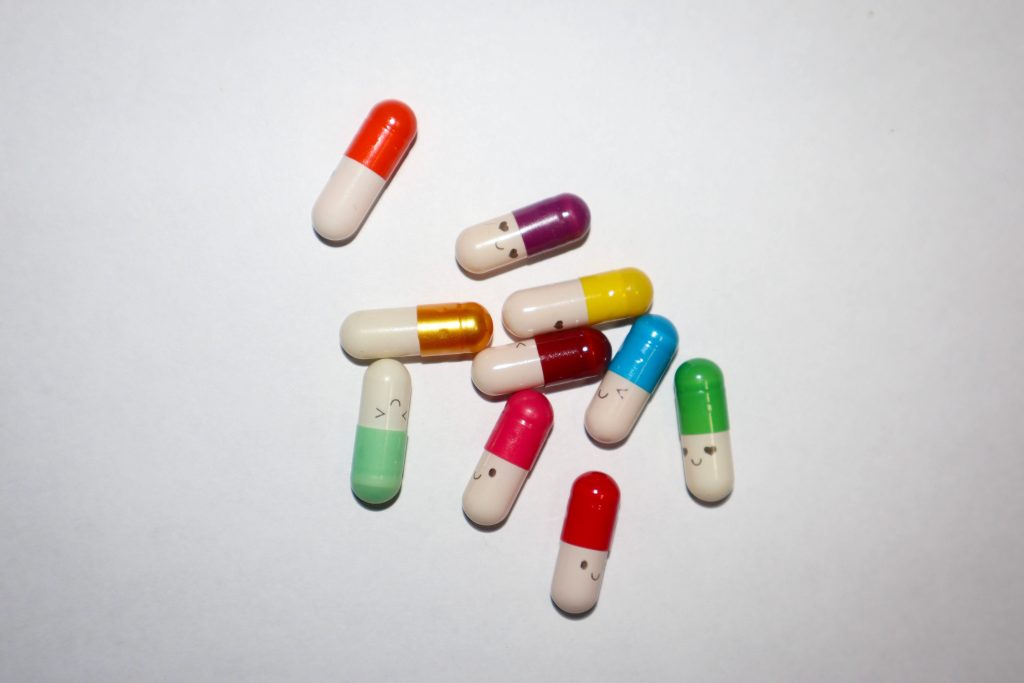
Bridget O’Sullivan
I recently got chatting to a group of friends about antidepressants and our experiences with them. The topic of brands came up. One friend ended up asking another, let’s call her Lucy[1], which antidepressant she takes. Lucy answered, very sure of herself, ‘serotonin’ (the neurotransmitter modulating mood…essentially our prime ‘happiness hormone’). We all looked at each other for a moment before cracking up. Someone corrected Lucy by saying ‘You mean sertraline? You can’t straight-up swallow happiness’. Lucy blushed a little, laughing along half-heartedly. The conversation moved on, but I doubt I was the only one left with questions.
What exactly do antidepressants do to our brain chemistry? Whilst it’s not known exactly how, they transmit chemicals, namely serotonin. Therefore, are we not effectively dosing ourselves up with serotonin when we take, for example, sertraline? By that logic, we are, in fact, being prescribed pint-sized pills of happiness merely retitled a medley of unpronounceable names (escitalopram, fluvoxamine, scitalopram etc).
So why did I initially laugh at Lucy’s (technically not incorrect) answer? Perhaps it was just because her mistake sounded stupid, and don’t we love to laugh at stupid? But I think it runs deeper than this. I think we all stood there ridiculing her because we’re not encouraged to directly correlate antidepressants with increased levels of serotonin.
The Wikipedia page for antidepressants reports side-effects (‘dry mouth, weight gain, dizziness, headaches, sexual dysfunction and emotional blunting’) in its opening paragraph. It also prefaces the page by stating that there are many methods for managing depression other than medication. This is, of course, true. It is information all candidates for antidepressant medication should be, and generally are, given. Having said this, introducing antidepressants by listing negative associations and implying that they are a ‘last resort’ damages their value. Because lest we forget that they do have significant value.
The fact that almost a million Brits are on antidepressants long-term (over 24 months) indicates this[2]. A percentage of people will always think that long-term antidepressant usage signals an unhealthy reliance. Confronting the probable fact that the majority believe this, is an even bleaker prospect. In almost every article I’ve researched online, the fact that antidepressants are not a long-term solution is heavily emphasised. Sky News published a piece last year titled ‘Long-term use of antidepressants could cause permanent damage, doctors warn’[3]. A few months later, The Guardian came out with ‘Millions of people in England taking medicines they can find hard to stop’[4]. Whilst there are long-term medical concerns that need further exploration, by choosing to publish such articles, both outlets are perpetuating the stigmatisation of long-term anti-depressant usage.
Many people with clinical depression have little choice but to take antidepressants long-term. No amount of societal-shaming or ‘long-term’ scaremongering is tantamount to the fallout of depriving a clinical depressive’s body of vital serotonin. If you’re born with a chemical imbalance, no number of ‘self-help’ books, CBT sessions or vitamin supplements will fully rectify that. Being born with low serotonin is thought to be hereditary. It’s like being born with an insufficient level of insulin, meaning you’re a type 1 diabetic. Medication is the only solution. Similarly, for many clinical depressives, medication is the only solution. Without it, their body cannot feed their mind sufficient levels of neurotransmitters responsible for maintaining mood. Their body will deplete itself of serotonin. Their demeanour will be tainted by an imbalance they were born with, an imbalance amended by antidepressants. Such medication doesn’t necessarily ‘mute’ emotions or ‘change’ personalities, as often conjectured. This might be the case for episodic or situational depressives, but it rarely is for those who are born starved of serotonin.
So, Lucy, I’m sorry I laughed at you. You were right. Serotonin is what you’re taking. Even if it’s not literally what’s inside of those little tablets, it’s what they work to build up to. The more we acknowledge the positive correlations between antidepressants and mood modulation among depressives, the less stigmatised they’ll become. Society has webbed a narrative that paints antidepressants as more harmful than helpful, thus more short-term than long-term. Undoing such damage and shame is a depressingly tall order.
[1] This is a pseudonym.
[2] https://www.theguardian.com/uk-news/2019/sep/10/addictive-medication-nhs-opioid-crisis-government-study-england.
[3] https://news.sky.com/story/long-term-use-of-antidepressants-could-cause-permanent-damage-doctors-warn-11688430.
[4] https://www.theguardian.com/uk-news/2019/sep/10/addictive-medication-nhs-opioid-crisis-government-study-england.
